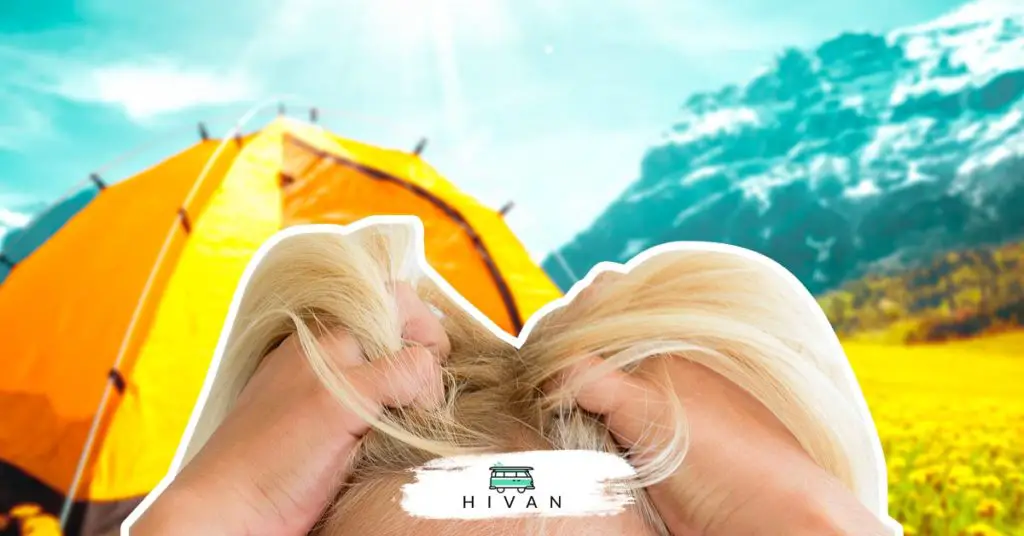Hi-van is supported by its audience. When you purchase using our links, we may earn an affiliate commission (no added cost to you). Learn more
Lice is a frustrating, infesting parasite that needs hair follicles to survive. These parasites spread their eggs from one human to another, making them difficult to stop. Since campers often gather in close groups, it’s understandable that you might be worried about lice and other parasites spreading during your next vacation.

It is possible to get lice from camping, but it is not very common. Lice are typically spread through close contact with someone who already has lice, or by sharing personal items such as hats, combs, and brushes.
Scrub permethrin lotion and warm water on the area, then wash your camping clothes on a hot cycle to eliminate the lice.
In this post, we’ll discuss whether or not camping is safe against lice, how you can prevent outbreaks and protect yourself, and why you shouldn’t go camping if you or anyone in your family has lice.
Can Campers Contract Lice?
Campers can contract lice because of their close proximity to other people. Children’s summer camps are especially susceptible to lice outbreaks because there are tens to hundreds of kids and teens sleeping and playing in close quarters.
Check your child’s head before and after the trip to ensure they don’t have lice.
Here’s a list of ways you can get lice while camping:
- If you share the same sleeping area (tents, bunk beds, motorhomes, etc.) with other people, you might have a chance to contract lice. While it’s unlikely that the average person has lice, ACA Camps estimate that up to 12 million children between 3 to 11 get lice every year, so it’s worth keeping a safe distance.
- Physical activities can result in lice infestations. These instances could range from tackle football to face painting. Lice need physical contact to spread. Any situation in which you touch someone else or they touch you is a potential lice spreader. The risk grows exponentially if you come in contact with someone’s head hair.
- Relaxing or hanging out in a public lounge area could spread lice. Many campgrounds offer community pools, barbecues, and indoor seating. Sharing a seat with a stranger could bring lice into the equation, but Healthline shows lice can live in fabric for up to a whole day.
As you can see, campers aren’t immune to lice. They can get it just as easily as anywhere else that’s shared with strangers and potential hosts. Lice need humans to spread and thrive, so you can’t get it if you don’t interact with other campers or touch the same surfaces they touch.
That being said, there’s a lot you can do to prevent the spread. Let’s review a handful of suggestions below.
How to Prevent Lice from Camping
To prevent lice from camping, follow these instructions:
- Wash your hair thoroughly before heading out on a camping trip and try to keep them as clean as possible.
- Avoid sharing personal items such as combs, brushes, hats, and towels.
- Avoid close contact with others who have lice, such as hugging or lying on the same bedding.
- Keep long hair tied back and avoid hair-to-hair contact with others.
- Regularly check for lice and nits (lice eggs) in your hair and scalp.
- If you or someone in your household has lice, treat it promptly and thoroughly to prevent its spread.
- Wash bedding, clothing, and personal items in hot water and dry them on high heat to kill any lice or nits.
- Vacuum carpets, upholstery, and car seats to remove any lice or nits that may have fallen off.
- Consider using lice prevention products, such as shampoos or sprays, if you are in a high-risk environment or have been exposed to lice.
By following these tips, you can reduce your risk of getting lice and prevent its spread to others.
Permethrin lotion is one of the most effective treatments for lice. Try the Lice Clinics of America Treatment Kit to cure the infestation. It comes with a comb and application tool to spread the lotion and remove the lice as quickly as possible. This is an excellent kit to have in case of a lice outbreak from campgrounds, hotels, and other vacation spots.
Can You Go Camping if You Have Lice?
It is not recommended to go camping if you have lice because you’ll risk giving them to other campers.
Furthermore, lice should be treated as soon as possible to prevent them from spreading to other parts of your body or getting skin infections. Going on a camping trip would give the lice more time to lay eggs in your hair, which could be detrimental to your health.
Camping with lice puts everyone else at risk. It’s never fun to cancel an exciting trip, but it’s much better for the people around you. Even if you’re in the treatment process and feel that you can’t be contagious, there’s still a big potential that you can spread lice. Unfortunately, the campers you spread it to could lose their hair or experience discomfort from the infestation.
The good news is that you can tackle a lice problem relatively quickly. If you know you have an infestation and there’s a planned trip around the corner, you can focus on the treatment and still go to your campground if it’s gone by then.
Conclusion
Now that you know campgrounds aren’t completely safe from lice outbreaks, you can head to your favorite campsites prepared. Expect the best and prepare for the worst, that way, you’ll have a good time without worrying about getting lice. Remember to inspect your family’s head hair after camping trips with other people.
Find this content useful 🙂 ?
Subscribe to our Newsletter and get a free Solar Electric Diagram + shopping list.


